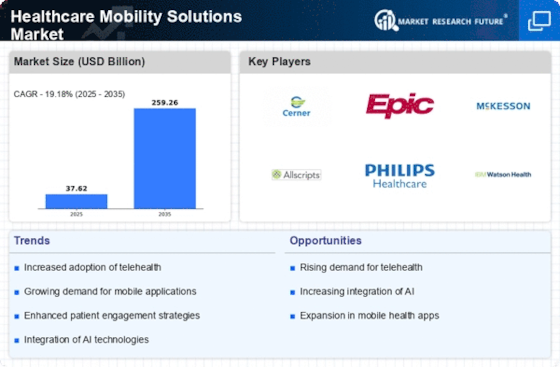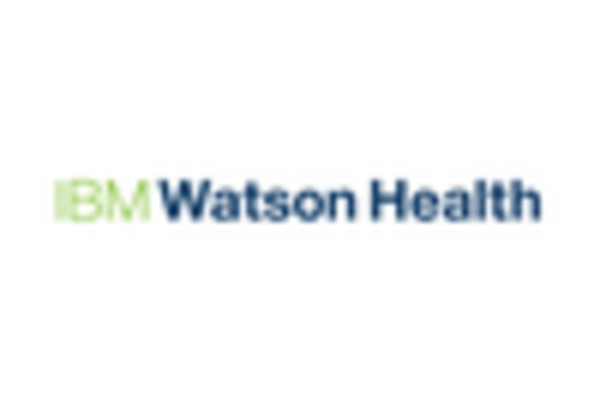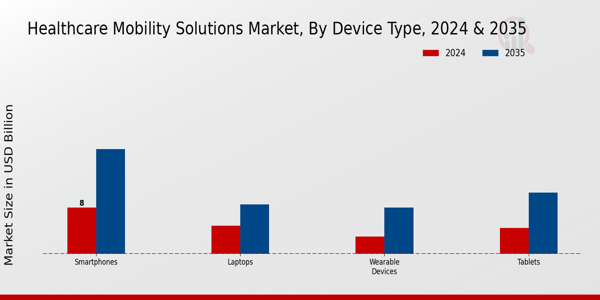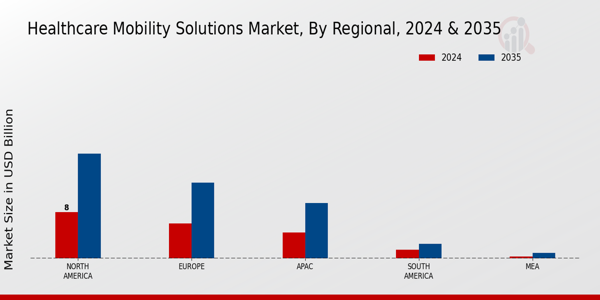Smartphones
Tablets
Wearable Devices
Laptops
Remote Patient Monitoring
Telemedicine
Healthcare Workflow Management
Medication Management
Hospitals
Home Care
Healthcare Providers
Pharmacies
Cloud Computing
Mobile Applications
Wireless Communication
Internet of Things
North America
Europe
South America
Asia Pacific
Middle East and Africa
North America Outlook (USD Billion, 2019-2035)
Healthcare Mobility Solutions Market by Device Type
Smartphones
Tablets
Wearable Devices
Laptops
Healthcare Mobility Solutions Market by Application Type
Remote Patient Monitoring
Telemedicine
Healthcare Workflow Management
Medication Management
Healthcare Mobility Solutions Market by End Use Type
Hospitals
Home Care
Healthcare Providers
Pharmacies
Healthcare Mobility Solutions Market by Technology Type
Cloud Computing
Mobile Applications
Wireless Communication
Internet of Things
Healthcare Mobility Solutions Market by Regional Type
US
Canada
US Outlook (USD Billion, 2019-2035)
Healthcare Mobility Solutions Market by Device Type
Smartphones
Tablets
Wearable Devices
Laptops
Healthcare Mobility Solutions Market by Application Type
Remote Patient Monitoring
Telemedicine
Healthcare Workflow Management
Medication Management
Healthcare Mobility Solutions Market by End Use Type
Hospitals
Home Care
Healthcare Providers
Pharmacies
Healthcare Mobility Solutions Market by Technology Type
Cloud Computing
Mobile Applications
Wireless Communication
Internet of Things
CANADA Outlook (USD Billion, 2019-2035)
Healthcare Mobility Solutions Market by Device Type
Smartphones
Tablets
Wearable Devices
Laptops
Healthcare Mobility Solutions Market by Application Type
Remote Patient Monitoring
Telemedicine
Healthcare Workflow Management
Medication Management
Healthcare Mobility Solutions Market by End Use Type
Hospitals
Home Care
Healthcare Providers
Pharmacies
Healthcare Mobility Solutions Market by Technology Type
Cloud Computing
Mobile Applications
Wireless Communication
Internet of Things
Europe Outlook (USD Billion, 2019-2035)
Healthcare Mobility Solutions Market by Device Type
Smartphones
Tablets
Wearable Devices
Laptops
Healthcare Mobility Solutions Market by Application Type
Remote Patient Monitoring
Telemedicine
Healthcare Workflow Management
Medication Management
Healthcare Mobility Solutions Market by End Use Type
Hospitals
Home Care
Healthcare Providers
Pharmacies
Healthcare Mobility Solutions Market by Technology Type
Cloud Computing
Mobile Applications
Wireless Communication
Internet of Things
Healthcare Mobility Solutions Market by Regional Type
Germany
UK
France
Russia
Italy
Spain
Rest of Europe
GERMANY Outlook (USD Billion, 2019-2035)
Healthcare Mobility Solutions Market by Device Type
Smartphones
Tablets
Wearable Devices
Laptops
Healthcare Mobility Solutions Market by Application Type
Remote Patient Monitoring
Telemedicine
Healthcare Workflow Management
Medication Management
Healthcare Mobility Solutions Market by End Use Type
Hospitals
Home Care
Healthcare Providers
Pharmacies
Healthcare Mobility Solutions Market by Technology Type
Cloud Computing
Mobile Applications
Wireless Communication
Internet of Things
UK Outlook (USD Billion, 2019-2035)
Healthcare Mobility Solutions Market by Device Type
Smartphones
Tablets
Wearable Devices
Laptops
Healthcare Mobility Solutions Market by Application Type
Remote Patient Monitoring
Telemedicine
Healthcare Workflow Management
Medication Management
Healthcare Mobility Solutions Market by End Use Type
Hospitals
Home Care
Healthcare Providers
Pharmacies
Healthcare Mobility Solutions Market by Technology Type
Cloud Computing
Mobile Applications
Wireless Communication
Internet of Things
FRANCE Outlook (USD Billion, 2019-2035)
Healthcare Mobility Solutions Market by Device Type
Smartphones
Tablets
Wearable Devices
Laptops
Healthcare Mobility Solutions Market by Application Type
Remote Patient Monitoring
Telemedicine
Healthcare Workflow Management
Medication Management
Healthcare Mobility Solutions Market by End Use Type
Hospitals
Home Care
Healthcare Providers
Pharmacies
Healthcare Mobility Solutions Market by Technology Type
Cloud Computing
Mobile Applications
Wireless Communication
Internet of Things
RUSSIA Outlook (USD Billion, 2019-2035)
Healthcare Mobility Solutions Market by Device Type
Smartphones
Tablets
Wearable Devices
Laptops
Healthcare Mobility Solutions Market by Application Type
Remote Patient Monitoring
Telemedicine
Healthcare Workflow Management
Medication Management
Healthcare Mobility Solutions Market by End Use Type
Hospitals
Home Care
Healthcare Providers
Pharmacies
Healthcare Mobility Solutions Market by Technology Type
Cloud Computing
Mobile Applications
Wireless Communication
Internet of Things
ITALY Outlook (USD Billion, 2019-2035)
Healthcare Mobility Solutions Market by Device Type
Smartphones
Tablets
Wearable Devices
Laptops
Healthcare Mobility Solutions Market by Application Type
Remote Patient Monitoring
Telemedicine
Healthcare Workflow Management
Medication Management
Healthcare Mobility Solutions Market by End Use Type
Hospitals
Home Care
Healthcare Providers
Pharmacies
Healthcare Mobility Solutions Market by Technology Type
Cloud Computing
Mobile Applications
Wireless Communication
Internet of Things
SPAIN Outlook (USD Billion, 2019-2035)
Healthcare Mobility Solutions Market by Device Type
Smartphones
Tablets
Wearable Devices
Laptops
Healthcare Mobility Solutions Market by Application Type
Remote Patient Monitoring
Telemedicine
Healthcare Workflow Management
Medication Management
Healthcare Mobility Solutions Market by End Use Type
Hospitals
Home Care
Healthcare Providers
Pharmacies
Healthcare Mobility Solutions Market by Technology Type
Cloud Computing
Mobile Applications
Wireless Communication
Internet of Things
REST OF EUROPE Outlook (USD Billion, 2019-2035)
Healthcare Mobility Solutions Market by Device Type
Smartphones
Tablets
Wearable Devices
Laptops
Healthcare Mobility Solutions Market by Application Type
Remote Patient Monitoring
Telemedicine
Healthcare Workflow Management
Medication Management
Healthcare Mobility Solutions Market by End Use Type
Hospitals
Home Care
Healthcare Providers
Pharmacies
Healthcare Mobility Solutions Market by Technology Type
Cloud Computing
Mobile Applications
Wireless Communication
Internet of Things
APAC Outlook (USD Billion, 2019-2035)
Healthcare Mobility Solutions Market by Device Type
Smartphones
Tablets
Wearable Devices
Laptops
Healthcare Mobility Solutions Market by Application Type
Remote Patient Monitoring
Telemedicine
Healthcare Workflow Management
Medication Management
Healthcare Mobility Solutions Market by End Use Type
Hospitals
Home Care
Healthcare Providers
Pharmacies
Healthcare Mobility Solutions Market by Technology Type
Cloud Computing
Mobile Applications
Wireless Communication
Internet of Things
Healthcare Mobility Solutions Market by Regional Type
China
India
Japan
South Korea
Malaysia
Thailand
Indonesia
Rest of APAC
CHINA Outlook (USD Billion, 2019-2035)
Healthcare Mobility Solutions Market by Device Type
Smartphones
Tablets
Wearable Devices
Laptops
Healthcare Mobility Solutions Market by Application Type
Remote Patient Monitoring
Telemedicine
Healthcare Workflow Management
Medication Management
Healthcare Mobility Solutions Market by End Use Type
Hospitals
Home Care
Healthcare Providers
Pharmacies
Healthcare Mobility Solutions Market by Technology Type
Cloud Computing
Mobile Applications
Wireless Communication
Internet of Things
INDIA Outlook (USD Billion, 2019-2035)
Healthcare Mobility Solutions Market by Device Type
Smartphones
Tablets
Wearable Devices
Laptops
Healthcare Mobility Solutions Market by Application Type
Remote Patient Monitoring
Telemedicine
Healthcare Workflow Management
Medication Management
Healthcare Mobility Solutions Market by End Use Type
Hospitals
Home Care
Healthcare Providers
Pharmacies
Healthcare Mobility Solutions Market by Technology Type
Cloud Computing
Mobile Applications
Wireless Communication
Internet of Things
JAPAN Outlook (USD Billion, 2019-2035)
Healthcare Mobility Solutions Market by Device Type
Smartphones
Tablets
Wearable Devices
Laptops
Healthcare Mobility Solutions Market by Application Type
Remote Patient Monitoring
Telemedicine
Healthcare Workflow Management
Medication Management
Healthcare Mobility Solutions Market by End Use Type
Hospitals
Home Care
Healthcare Providers
Pharmacies
Healthcare Mobility Solutions Market by Technology Type
Cloud Computing
Mobile Applications
Wireless Communication
Internet of Things
SOUTH KOREA Outlook (USD Billion, 2019-2035)
Healthcare Mobility Solutions Market by Device Type
Smartphones
Tablets
Wearable Devices
Laptops
Healthcare Mobility Solutions Market by Application Type
Remote Patient Monitoring
Telemedicine
Healthcare Workflow Management
Medication Management
Healthcare Mobility Solutions Market by End Use Type
Hospitals
Home Care
Healthcare Providers
Pharmacies
Healthcare Mobility Solutions Market by Technology Type
Cloud Computing
Mobile Applications
Wireless Communication
Internet of Things
MALAYSIA Outlook (USD Billion, 2019-2035)
Healthcare Mobility Solutions Market by Device Type
Smartphones
Tablets
Wearable Devices
Laptops
Healthcare Mobility Solutions Market by Application Type
Remote Patient Monitoring
Telemedicine
Healthcare Workflow Management
Medication Management
Healthcare Mobility Solutions Market by End Use Type
Hospitals
Home Care
Healthcare Providers
Pharmacies
Healthcare Mobility Solutions Market by Technology Type
Cloud Computing
Mobile Applications
Wireless Communication
Internet of Things
THAILAND Outlook (USD Billion, 2019-2035)
Healthcare Mobility Solutions Market by Device Type
Smartphones
Tablets
Wearable Devices
Laptops
Healthcare Mobility Solutions Market by Application Type
Remote Patient Monitoring
Telemedicine
Healthcare Workflow Management
Medication Management
Healthcare Mobility Solutions Market by End Use Type
Hospitals
Home Care
Healthcare Providers
Pharmacies
Healthcare Mobility Solutions Market by Technology Type
Cloud Computing
Mobile Applications
Wireless Communication
Internet of Things
INDONESIA Outlook (USD Billion, 2019-2035)
Healthcare Mobility Solutions Market by Device Type
Smartphones
Tablets
Wearable Devices
Laptops
Healthcare Mobility Solutions Market by Application Type
Remote Patient Monitoring
Telemedicine
Healthcare Workflow Management
Medication Management
Healthcare Mobility Solutions Market by End Use Type
Hospitals
Home Care
Healthcare Providers
Pharmacies
Healthcare Mobility Solutions Market by Technology Type
Cloud Computing
Mobile Applications
Wireless Communication
Internet of Things
REST OF APAC Outlook (USD Billion, 2019-2035)
Healthcare Mobility Solutions Market by Device Type
Smartphones
Tablets
Wearable Devices
Laptops
Healthcare Mobility Solutions Market by Application Type
Remote Patient Monitoring
Telemedicine
Healthcare Workflow Management
Medication Management
Healthcare Mobility Solutions Market by End Use Type
Hospitals
Home Care
Healthcare Providers
Pharmacies
Healthcare Mobility Solutions Market by Technology Type
Cloud Computing
Mobile Applications
Wireless Communication
Internet of Things
South America Outlook (USD Billion, 2019-2035)
Healthcare Mobility Solutions Market by Device Type
Smartphones
Tablets
Wearable Devices
Laptops
Healthcare Mobility Solutions Market by Application Type
Remote Patient Monitoring
Telemedicine
Healthcare Workflow Management
Medication Management
Healthcare Mobility Solutions Market by End Use Type
Hospitals
Home Care
Healthcare Providers
Pharmacies
Healthcare Mobility Solutions Market by Technology Type
Cloud Computing
Mobile Applications
Wireless Communication
Internet of Things
Healthcare Mobility Solutions Market by Regional Type
Brazil
Mexico
Argentina
Rest of South America
BRAZIL Outlook (USD Billion, 2019-2035)
Healthcare Mobility Solutions Market by Device Type
Smartphones
Tablets
Wearable Devices
Laptops
Healthcare Mobility Solutions Market by Application Type
Remote Patient Monitoring
Telemedicine
Healthcare Workflow Management
Medication Management
Healthcare Mobility Solutions Market by End Use Type
Hospitals
Home Care
Healthcare Providers
Pharmacies
Healthcare Mobility Solutions Market by Technology Type
Cloud Computing
Mobile Applications
Wireless Communication
Internet of Things
MEXICO Outlook (USD Billion, 2019-2035)
Healthcare Mobility Solutions Market by Device Type
Smartphones
Tablets
Wearable Devices
Laptops
Healthcare Mobility Solutions Market by Application Type
Remote Patient Monitoring
Telemedicine
Healthcare Workflow Management
Medication Management
Healthcare Mobility Solutions Market by End Use Type
Hospitals
Home Care
Healthcare Providers
Pharmacies
Healthcare Mobility Solutions Market by Technology Type
Cloud Computing
Mobile Applications
Wireless Communication
Internet of Things
ARGENTINA Outlook (USD Billion, 2019-2035)
Healthcare Mobility Solutions Market by Device Type
Smartphones
Tablets
Wearable Devices
Laptops
Healthcare Mobility Solutions Market by Application Type
Remote Patient Monitoring
Telemedicine
Healthcare Workflow Management
Medication Management
Healthcare Mobility Solutions Market by End Use Type
Hospitals
Home Care
Healthcare Providers
Pharmacies
Healthcare Mobility Solutions Market by Technology Type
Cloud Computing
Mobile Applications
Wireless Communication
Internet of Things
REST OF SOUTH AMERICA Outlook (USD Billion, 2019-2035)
Healthcare Mobility Solutions Market by Device Type
Smartphones
Tablets
Wearable Devices
Laptops
Healthcare Mobility Solutions Market by Application Type
Remote Patient Monitoring
Telemedicine
Healthcare Workflow Management
Medication Management
Healthcare Mobility Solutions Market by End Use Type
Hospitals
Home Care
Healthcare Providers
Pharmacies
Healthcare Mobility Solutions Market by Technology Type
Cloud Computing
Mobile Applications
Wireless Communication
Internet of Things
MEA Outlook (USD Billion, 2019-2035)
Healthcare Mobility Solutions Market by Device Type
Smartphones
Tablets
Wearable Devices
Laptops
Healthcare Mobility Solutions Market by Application Type
Remote Patient Monitoring
Telemedicine
Healthcare Workflow Management
Medication Management
Healthcare Mobility Solutions Market by End Use Type
Hospitals
Home Care
Healthcare Providers
Pharmacies
Healthcare Mobility Solutions Market by Technology Type
Cloud Computing
Mobile Applications
Wireless Communication
Internet of Things
Healthcare Mobility Solutions Market by Regional Type
GCC Countries
South Africa
Rest of MEA
GCC COUNTRIES Outlook (USD Billion, 2019-2035)
Healthcare Mobility Solutions Market by Device Type
Smartphones
Tablets
Wearable Devices
Laptops
Healthcare Mobility Solutions Market by Application Type
Remote Patient Monitoring
Telemedicine
Healthcare Workflow Management
Medication Management
Healthcare Mobility Solutions Market by End Use Type
Hospitals
Home Care
Healthcare Providers
Pharmacies
Healthcare Mobility Solutions Market by Technology Type
Cloud Computing
Mobile Applications
Wireless Communication
Internet of Things
SOUTH AFRICA Outlook (USD Billion, 2019-2035)
Healthcare Mobility Solutions Market by Device Type
Smartphones
Tablets
Wearable Devices
Laptops
Healthcare Mobility Solutions Market by Application Type
Remote Patient Monitoring
Telemedicine
Healthcare Workflow Management
Medication Management
Healthcare Mobility Solutions Market by End Use Type
Hospitals
Home Care
Healthcare Providers
Pharmacies
Healthcare Mobility Solutions Market by Technology Type
Cloud Computing
Mobile Applications
Wireless Communication
Internet of Things
REST OF MEA Outlook (USD Billion, 2019-2035)
Healthcare Mobility Solutions Market by Device Type
Smartphones
Tablets
Wearable Devices
Laptops
Healthcare Mobility Solutions Market by Application Type
Remote Patient Monitoring
Telemedicine
Healthcare Workflow Management
Medication Management
Healthcare Mobility Solutions Market by End Use Type
Hospitals
Home Care
Healthcare Providers
Pharmacies
Healthcare Mobility Solutions Market by Technology Type
Cloud Computing
Mobile Applications
Wireless Communication
Internet of Things




















Leave a Comment